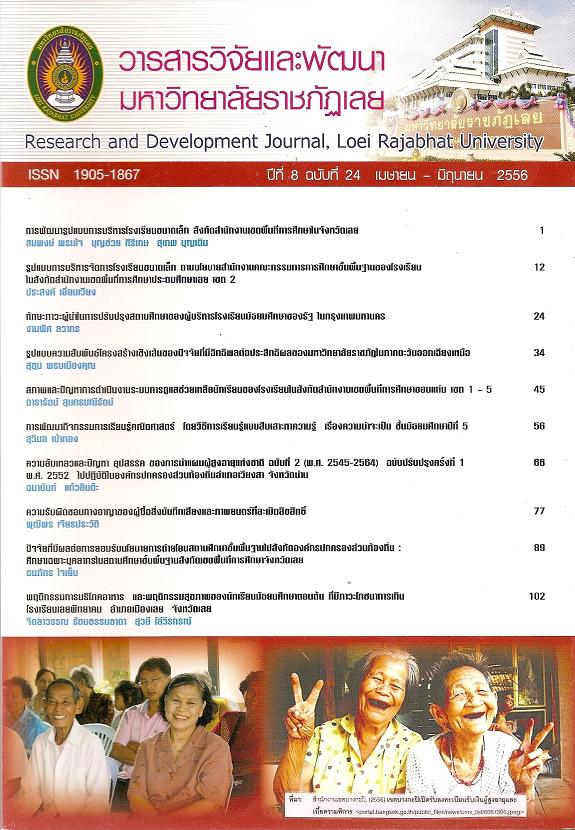พฤติกรรมการบริโภคอาหาร และพฤติกรรมสุขภาพของนักเรียนมัธยมศึกษาตอนต้น ที่มีภาวะโภชนาการเกิน โรงเรียนเลยพิทยาคม อำเภอเมืองเลย จังหวัดเลย
Keywords:
ภาวะโภชนาการเกิน, การบริโภคอาหาร, พฤติกรรมสุขภาพ, overweight, food consumption, health behaviorsAbstract
บทคัดย่อ
ปัจจุบันโรคอ้วนหรือภาวะน้ำหนักตัวเกินเป็นปัญหาสาธารณสุขที่สำคัญของหลายประเทศทั่วโลก จากการสำรวจภาวะโภชนาการนักเรียนชั้นมัธยมศึกษาตอนต้น โรงเรียนเลยพิทยาคม อำเภอเมืองเลย จังหวัดเลย พบภาวะโภชนาการเกินเกณฑ์ร้อยละ 11.20 การวิจัยเชิงพรรณนานี้มีวัตถุประสงค์เพื่อศึกษาพฤติกรรมการบริโภคอาหาร และพฤติกรรมสุขภาพของนักเรียนที่มีภาวะโภชนาการเกิน ชั้นมัธยมศึกษาปีที่ 1 - 3 ภาคเรียนที่ 2 ปีการศึกษา 2554 จำนวน 142 คน รวบรวมข้อมูล โดยใช้แบบสอบถาม วิเคราะห์ข้อมูลด้วยสถิติเชิงพรรณนา ร้อยละ ค่าเฉลี่ย ส่วนเบี่ยงเบนมาตรฐาน
ผลการศึกษา พบว่า ความรู้ทางโภชนาการของนักเรียนอยู่ในระดับสูง ร้อยละ 73.94 ส่วนใหญ่มีทัศนคติต่อการบริโภคอาหารระดับสูงร้อยละ 71.83 ส่วนการบริโภคอาหารบริโภคอาหาร 3 มื้อร้อยละ 92.25 โดยบริโภคอาหารมื้อกลางวันทุกคนที่โรงอาหารของโรงเรียน อาหารระหว่างมื้อที่บริโภคเป็นประจำ คือ ดื่มนม ร้อยละ 47.89 ขนมกรุบกรอบ ร้อยละ 45.07 นอกจากการบริโภคระหว่างวันปกติและวันหยุดแตกต่างกันร้อยละ 59.86 โดยบริโภคอาหารในวันหยุดมากกว่าวันปกติร้อยละ 70.59 ด้านความถี่การบริโภคอาหาร เช่น ข้าวเจ้า ข้าวเหนียว และก๋วยเตี๋ยว/ขนมจีนเป็นประจำทุกวันร้อยละ 80.28 ร้อยละ 55.63 และร้อยละ 36.62 ตามลำดับ นมสด และนมเปรี้ยวทุกวัน ร้อยละ 55.63 และร้อยละ 28.87 ตามลำดับ อาหารทอดอาหารผัดเป็นประจำทุกวัน ร้อยละ 47.89 และร้อยละ 54.23 ผักและผลไม้เป็นประจำทุกวัน ร้อยละ57.75 และร้อยละ 53.52 ตามลำดับ ดื่มน้ำผลไม้ น้ำผักเป็นประจำทุกวัน ร้อยละ 34.51 ส่วนใหญ่บริโภคของหวานและไอศกรีม 1-2 ครั้งต่อสัปดาห์เท่ากัน ร้อยละ 31.69 นอกจากนี้ พบว่าบริโภคขนมขบเคี้ยวเป็นประจำทุกวัน ร้อยละ 45.07 แบบแผนอาหารที่บริโภคประจำวันในวันปกติ ส่วนใหญ่บริโภคอาหารจานเดียวในมื้อเช้า อาหารกลางวันบริโภคก๋วยเตี๋ยว ขนมและอาหารว่าง อาหารเย็นบริโภคอาหารจานเดียว วันหยุด เช้า กลางวันและเย็น ส่วนใหญ่บริโภคอาหารจานเดียว ด้านการออกกำลังกาย พบว่า ในหนึ่งสัปดาห์ออกกำลังกาย 3-4 ครั้ง ครั้งละมากกว่าหรือเท่ากับ 30 นาที ร้อยละ 65.14 ออกกำลังกายในชั่วโมงเรียนวิชาพละศึกษา ชนิดกีฬา คือ วิ่ง เตะฟุตบอล และเดินเร็ว และร้อยละ 23.24 ไม่ออกกำลังกายโดยให้เหตุผลว่าขี้เกียจออกกำลังกาย ส่วนการพักผ่อนนอนหลับประมาณ 7-8 ชั่วโมง และไม่มีปัญหาในเรื่องนอนหลับ
ปัญหาโภชนาการเกินที่พบเกิดจากพฤติกรรมการบริโภคที่ไม่เหมาะสม ดังนั้นควรส่งเสริมการบริโภคอาหารที่มีไขมันน้อยและส่งเสริมการบริโภคผัก ผลไม้ ทั้งนี้โรงเรียนควรมีมาตรการที่เหมาะสมในการควบคุมอาหารและขนมที่จำหน่ายในโรงเรียนและกระตุ้นการเคลื่อนไหวร่างกายของนักเรียนให้มากขึ้น
Abstract
Overweight or obesity is a major public health problem in many countries around the world. A survey on nutritional status of students in secondary school at Loeipittayakom School found that 11.20% were overweight. This descriptive research aimed to conducted in food consumption behaviors and health behaviors of the overweigh secondary school students. One hundred and forty-two overweigh students studying in Grade 1 - 3 Year of semester 2, academic year 2011 were participated. Data were obtained by questionnaire, and were analyzed by descriptive statistics such as percentage, mean and standard deviation.
The results showed that nutritional knowledge of the student was high 73.94%. For attitude toward food consumption, majority of the student (71.83%) had high positive attitude. Regarding eating habit, 92.25% had 3 meals a day which everyone had lunch. Most students had meal at school cafeteria. Break between meal, 47.89% had regular milk and 45.07% had snacks. Apart from that, 59.86% had different meal comparing between weekdays and weekends, and 70.59% took more on weekends than weekdays. Regarding to food frequencies, 80.28%, 55.63% and 36.62% regularly had ordinary rice, sticky rice and noodle/Thai noodle, respectively. Fresh milk and yogurt were taken daily with 55.63% and 28.87%, respectively. Daily taking deep fried and fried diskes were reported 47.89% and 54.23%, respectively. Consumption of fruits and vegetables daily were reported 57.75% and 53.52%, respectively. Drinking fruit juices and vegetable juices daily were 34.51%. Most of them 31.69% had sweets and ice cream 1-2 times per week. Besides, 45.07% had snack every day. Regarding daily food patterns of the students on weekdays and weekends. On weekends most students consumed one-plate meal in the morning, for lunch most of them consumed noodles, desert and snacks, one dish food for dinner, for breakfast and dinner. The physical of they had activities 3-4 times a week, each time greater than or equal to 30 minutes, 65.14 % of students did in physical education class. Type of sports were running, soccer, jogging and brisk walking. They did not exercise 23.24 % because of too lazy. The students slept about 7-8 hours and sleepless issue was not reported. Regarding stress, 41.55% had moderate stress, which was 75.35 % were attributed to learning, and most of the classes (81.69%) relieved stress by watching movies or listening to music. Nutritional problems are caused by food consumption behaviors. Consumption of food with low fat and high vegetable and fruit should be promoted. In addition, the school should have proper measures to control food and sweets sold in school including encourage the students for more physical activity.
Downloads
How to Cite
Issue
Section
License
ข้อความที่ปรากฎในวารสารฉบับนี้เป็นความคิดเห็นของผู้เขียนแต่ละท่าน สถาบันวิจัยและพัฒนา มหาวิทยาลัยราชภัฏเลย และกองบรรณาธิการ ไม่จำเป็นต้องเห็นด้วยและไม่มีส่วนรับผิดชอบใดๆ
สถาบันวิจัยและพัฒนา มหาวิทยาลัยราชภัฏเลย ขอให้ผู้อ่านอ้างอิงในกรณีที่ท่านคัดลอกเนื้อหาบทความในวารสารฉบับนี้



